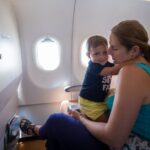Last Updated on August 6, 2023 by Muhammad Sohaib
First time parenthood is a significant milestone that is accompanied by joy, love, and just a little bit of anxiety.
As first time parents, you are about to experience a revolutionary stage that will drastically change your lives and fill your hearts with unfathomable love.
You may get all the information you require to provide a nurturing and loving environment for your child with our first time Parents guide for newborns.
Here is a road map to help you through this new phase of your life.
Preparing Yourself For The Journey Of First Time Parenting
Take the first steps in your parenthood journey by immersing yourself in valuable resources.
Start by reading books, attending parenting classes, or browsing reliable websites. Learning about child development, parenting techniques, and safety measures, gives you the confidence you need.
Dressing Your Little One: Safety and Comfort First
Here’s an important thing to keep in mind is that the babies can’t regulate their body temperature as well as adults until they’re about 6 months old.
To ensure your baby stays comfortable, the American Academy of Pediatrics (AAP) advises adding one more layer of clothing than what you’d wear to feel cozy. So, when preparing their outfit, think about packing some layers to keep them snug and happy.
Don’t forget about those adorable socks or booties! Whether it’s warm or chilly outside.
Ensure Your Baby Safety
When In Hands
While holding your precious baby in your arms, follow these essential tips to ensure a secure and comfortable
- Always support the baby’s head and neck with your hands while holding them.
- Avoid holding them too tightly.
- When holding your baby, never leave them unattended, especially if you are on a high surface.
During Travel
When traveling with your baby, safety should always be a top priority. Here are some important tips to keep in mind that help the journey of !st time parents.
- Use a suitable car seat for a little angel.
- Make sure the straps are secure and in the right place as you buckle your infant in the car seat.
- Make sure the vehicle is at an appropriate humidity level or tempeature and is well-ventilated.
- Take stops throughout a long drive to allow your baby to stretch, eat, and have a diaper change.
Feeding Your Baby
During the first several weeks of motherhood, feeding your baby—whether through breastfeeding or formula feeding—is an important and fulfilling experience.
There are important rules to abide by in order to safeguard your child and strengthen your bond, regardless of the course you choose.
Here are valuable tips for both breastfeeding and formula feeding for first time parents.
Breastfeeding
Each baby has a distinct feeding pattern. Breastfeeding is an excellent way to provide your child the nutrients they need and forge strong bonds with them.
Your adorable baby has a little stomach, therefore they don’t need a lot of milk to make them full. Because of this, your baby can feel the need to eat frequently, up to once every one to three hours. This frequent feeding gives your baby the chance to practice the crucial swallowing and sucking abilities.
Ensure your baby latches onto the breast correctly to promote effective milk flow and minimize discomfort.
(According to CDC), breastfeeding starts as soon as possible after birth to encourage milk production and skin-to-skin bonding.
During breastfeeding, you should consume an extra 300-400 calories daily.
Formula Feeding
If breastfeeding is not available then formula milk is the best choice. Formula milk is available in different forms such as liquid, concentrate, or powder.
If you choose formula feeding, select a formula milk that is suitable for your baby’s age and needs and follow the instructions on the package to ensure safety.
- Use sterilized bottles and nipples
- Prepare the formula with clean and boiled water.
- Hold your baby in a semi-upright position during feeding to prevent choking and reflux.
Introducing Solid Foods
In the early months, your baby will feed frequently (approximately 8-12 feedings per day)
Around 6 months old, start introducing single-ingredient, soft, and easily digestible solid foods like pureed fruits and vegetables. That’s why the duration between feedings can extend to 5 hours. Offer new foods one by one.
Give new foods one at a time in a small amount to check for allergies and give your baby time to get used to different tastes and textures.
Burp After Each Feeding
Whether your baby is breastfed or given formula, don’t forget to burp them after every feeding to prevent gas buildup and discomfort.
Technique for burping:
You can assist the release of trapped air and avoid gas build-up in your baby’s tummy by gently and rhythmically patting or massaging their back.
Baby Massage: A Loving Touch for Little Ones
Getting to know and bond with your baby through baby massage is a fantastic experience. It offers numerous benefits, including aiding in the development of your baby’s senses
Here’s a fantastic First-Time Parents Guide to get you started on baby massage
- Choose a moment when your baby is relaxed and satisfied, especially after a bath or when they are awake but not hungry or tired.
- Lay your infant on a soft blanket or towel in a warm, peaceful, and comfortable area.
- To massage the baby, use a natural oil that is safe for babies, such as coconut oil or almond oil. To make sure your infant has no allergies or sensitivities, test a small bit on their skin beforehand.
- Start with light and gentle strokes on your baby’s body by using your palms and fingers. Follow your baby’s cues and be attentive to their reactions. Your baby’s well-being is the priority during the massage.
- Learn several methods for massaging babies, such as backstrokes, tummy strokes, and leg strokes. Each method has advantages of its own and can be pleasurable for your baby.
- While giving your infant a massage, be aware of their reactions or warning signs. You can try again later if they feel uncomfortable or uninterested.
- Maintain eye contact and speak lovingly to your child throughout the massage in an effort to strengthen your relationship.
Trust yourself
Parents, have faith in yourself. You are your child’s best teacher because of the unique nature of your relationship with them. Parenting is a journey that you should embrace with confidence since you are doing a fantastic job. As you watch your child develop and prosper, remember to honor every milestone, no matter how minor it may be.
End Line
I hope that this First-Time Parents Guide has provided you with valuable help and insights. Being a first-time parent is a thrilling adventure full with fresh feelings and experiences.
Embrace each moment with an open heart. Trust yourself and your instincts, for you know your baby best. Asking for support and advice from your loved ones as you travel shouldn’t be a problem.
Celebrate every little achievement and enjoy the special moments of bonding with your little one.

Muhammad Sohaib is an experienced SEO expert with over 4 years in the digital marketing world. He is the founder of MomsChild.com, a growing parenting blog that covers topics related to kids, moms, baby products, and helpful family tips. Sohaib combines his SEO knowledge with a passion for creating content that supports parents in making informed choices. Through MomsChild, he shares practical advice, trusted product guides, and informative resources to help families navigate the joys and challenges of parenting in today’s world.






